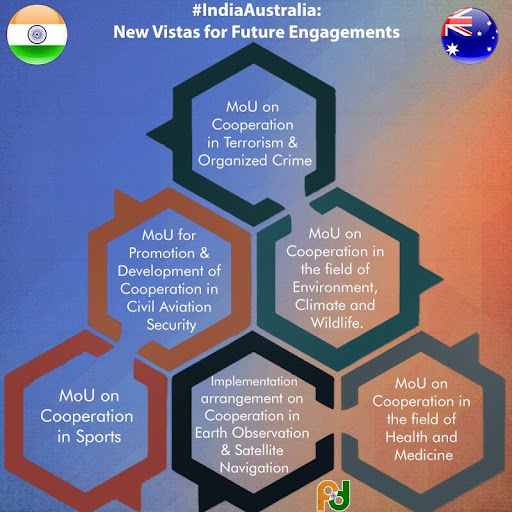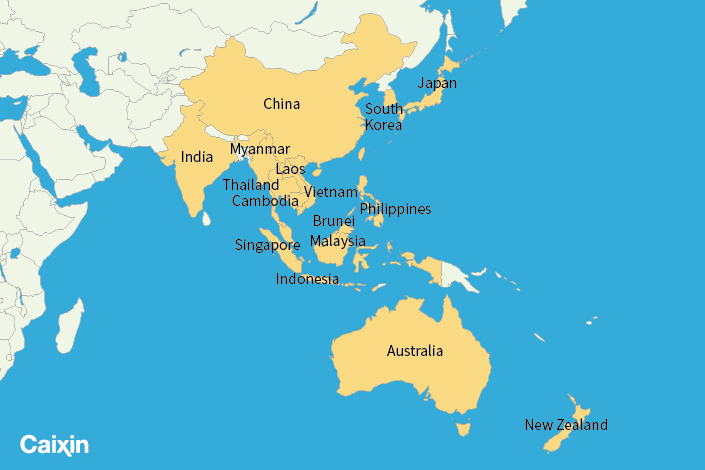Free Courses Sale ends Soon, Get It Now


Free Courses Sale ends Soon, Get It Now



Copyright infringement is not intended
Context: India and Australia are expected to complete negotiations for an interim free trade agreement (FTA), which is officially dubbed as the Comprehensive Economic Cooperation Agreement (CECA) by the end of 2022.
About Comprehensive Economic Cooperation Agreement:
India-Australia relations:
Historical background:
· Before independence, Australia and India were both part of the British Empire.
· They also share political, economic, security, lingual and sporting ties.
· As a result of British colonisation, cricket has emerged as a strong cultural connection between the two nations, as well as the English language.
· Australia has traditionally supported India's position on Arunachal Pradesh, which is subject to diplomatic disputes between India and the People's Republic of China.
· Principle and pragmatism have been the two pillars on which the two countries have built their partnership.

Areas of cooperation:
· Besides both being members of the Commonwealth of Nations, both nations are founding members of the United Nations, and members of regional organisations including the Indian Ocean Rim Association for Regional Cooperation and ASEAN Regional forum.
· India and Australia have a lot in common, as both are Westminster-style secular, multicultural democracies.
· The Australian foreign policy blueprint sees healthy relations with India must for stability and openness of the Indian Ocean.
· Both the countries have common interests in upholding international law, especially in relation to freedom of navigation and maritime security.
· Australia’s is part of Quadrilateral Security Dialogue (Quad) which is a outcome-oriented cooperation for building capacity and improving interoperability in the Indo-Pacific region.
· India’s and Australis share the same vision “free and open Indo-Pacific” with a rules-based order and open market economies, along with the freedom of navigation in high seas and overflight.
· Both countries share the same concern about China’s expansionist behavior, whether in the South China Sea or along China’s land border, especially the ongoing India-China border standoff.
Security cooperation:
· In June 2020, India and Australia had elevated their relationship to a ‘Comprehensive Strategic Partnership’.
· They hold the “Two-Plus-Two” dialogue meets to discuss vital security issues.
· India and Australia signed Mutual Logistics Support Agreement to allows each country to use the other's bases for the refuelling and maintenance of aircraft and naval vessels
· Military cooperation between Australia and India includes the regular joint exercise AUSTRA HIND (a Special Forces Army Exercise), AUSINDEX (a bilateral maritime exercise), KAKADU (a multilateral maritime exercise), and Exercise Pitch Black (a multilateral air exercise).
· Recently, Australia joined the Malabar exercise, which also include the United States and Japan.
Nuclear cooperation:
·
|
The Treaty on the Non-Proliferation of Nuclear Weapons or Non-Proliferation Treaty · It is an international treaty whose objective is to prevent the spread of nuclear weapons and weapons technology, to promote cooperation in the peaceful uses of nuclear energy, and to further the goal of achieving nuclear disarmament and general and complete disarmament. · India, Israel, Pakistan and South Sudan, has not joined it. |
In 2012, Australian government decided to sell uranium to India despite India not being a signatory to the nuclear Non Proliferation Treaty.
· Canberra’s overturning of a ban on uranium sales to India was seen as a removal of a diplomatic thorn between the two nations, potentially opening up a new and growing market for Australian suppliers.
People-to-people ties
· Growing people-to-people ties, including an increasing Indian diaspora in Australia as well as Indian students choosing Australia for higher education, tourism, sports etc,
· There are already more than 100,000 Indian students who are studying in Australia, more than two-thirds of whom are pursuing higher education.
Economic relations:
· India was Australia's first major trading partner with imports through the East India Company, exports from Australia to India dates back to the late 18th century, when coal from Sydney and horses from New South Wales were exported to India.
· Trade is highly skewed towards Australia.
· India is Australia’s fifth largest trade partner, with trade in goods and services worth A$29 billion, representing 3.6 percent of the total Australian trade in 2017-18.
· Australia mainly exports Coal, services (mainly education), vegetables for consumer consumption, gold, copper ores and concentrates, while India's chief exports are refined petroleum, services (professional services such as outsourcing), medicaments, pearls, gems and jewelry.
· India and Australia have established a $100 million Strategic Research Fund.
Way Forward:
· Australia and India should negotiate to revive the Comprehensive Economic Cooperation Agreement (CECA) to improve trade and market access.
· There is need to address the gaps in the educational cooperation between India and Australia and associated issues of attack on Indian students.
· There is also a need to promote and popularize the New Colombo Plan of Australia, which encourages Australian undergraduate students to study in Indo-Pacific countries in general and India in particular.
© 2024 iasgyan. All right reserved